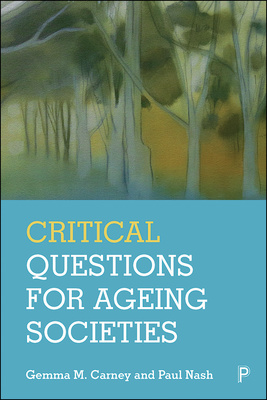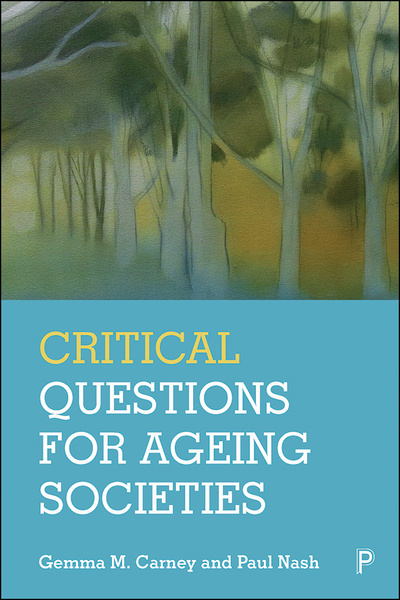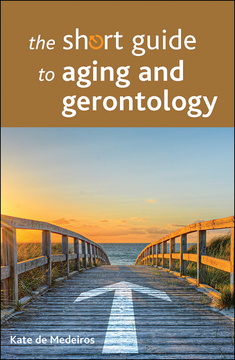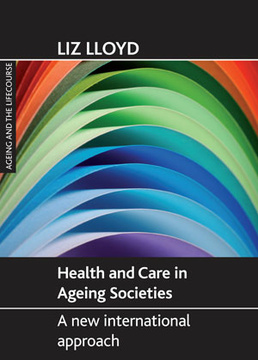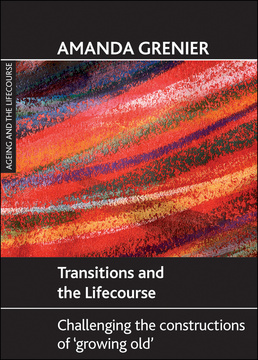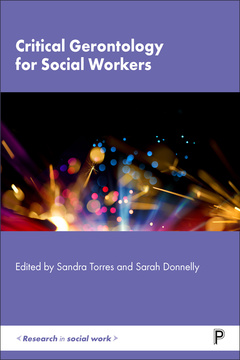Critical Questions for Ageing Societies
By Gemma Carney and Paul Nash
Published
Sep 15, 2020Page count
234 pagesISBN
978-1447351580Dimensions
240 x 172 mmImprint
Policy PressPublished
Sep 15, 2020Page count
234 pagesISBN
978-1447351573Dimensions
240 x 172 mmImprint
Policy PressPublished
Sep 15, 2020Page count
234 pagesISBN
978-1447351597Dimensions
Imprint
Policy PressPublished
Sep 15, 2020Page count
234 pagesISBN
978-1447351597Dimensions
Imprint
Policy PressBrowse online resources
Nominated for the Richard Kalish award in 2021.
In the media
On our blog: Human rights, age discrimination and a global pandemic
Critical Questions for Ageing Societies by Gemma M. Carney and Paul Nash Canadian Journal on Ageing
'Solidarity between Generations during Lockdown' on TEDx Talks
'Out with the old: Coronavirus highlights why we need new names for aging' in The Conversation
'Coronavirus shows how ageism is harmful to health of older adults' in The Conversation
'Covid-19 deaths reveal ageist perceptions of seniors, which affects the care they receive' in The Washington Post
'We need younger people to see the issues of age stereotyping' in The Age Buster
This myth-busting and question-focused textbook tackles the fascinating and important social and policy issues posed by the challenges and opportunities of ageing.
The unique pedagogical approach recognises the gap between the lives of students and older people, and equips students with the conceptual, analytical and critical tools to understand what it means to grow old and what it means to live in an ageing society.
Features include:
•Myth-busting boxes incorporated into each chapter that unpack the common assumptions and stereotypes about ageing and older people in a clear and striking way;
•A multidisciplinary and issue-focused approach, interspersed with lively examples and vignettes bringing the debates to life;
•Group and self-study activities;
•A comprehensive glossary of key terms.
Answering questions which have arisen over years of longitudinal and systematic research on the social implications of ageing, this lively and engaging textbook provides an essential foundation for students in gerontology, sociology, social policy and related fields.
"A refreshing approach to the study of the social aspects of ageing. It introduces critical questions which challenge stereotypes about ageing and blends theory, practice and policy. A must read for everyone interested in gerontology." Judith Phillips OBE, University of Stirling
"A very helpful text which adopts an international lens on ageing issues. I especially like the quizzes and exercises as they complement the text well and are engaging. I have already used one in my teaching." Alisoun Milne, University of Kent
"I like the topics selected - all have great relevance in contemporary gerontology and the exercises at the end of each chapter promote students to reflect on what they have read and to check understanding. The book could be read as a novel because the flow is excellent. The references used are excellent and the authors actively promote further reading. It is an informed, intelligent book that is an asset to students." Angela Kydd, Robert Gordon University
"This remarkable book provides an excellent introduction to crucial issues facing ageing societies. It succeeds in challenging its readers to question their assumptions about ageing and later life." Thomas Scharf, Newcastle University
"An accessible introduction to current issues facing ageing societies. The critical perspective encourages the reader to question taken-for-granted assumptions, and explore the evidence behind the headlines." Rosalind Willis, University of Southampton
“An important, interesting and engaging book. It challenges conventional stereotypes and myths about age and ageing and encourages readers to critically interrogate the role and position of older people in modern societies and economies.” Eamon O’Shea, National University of Ireland Galway
Gemma M. Carney is a critical gerontologist and Senior Lecturer in Social Policy and Ageing at Queen’s University Belfast.
Paul Nash is a chartered psychologist and Associate Professor in the Leonard Davis School of Gerontology at the University of Southern California.
Both authors won student-nominated teaching awards for their classes in gerontology and social policy in 2019.
What is population ageing? (Demography)
When am I officially past it? The ageist zeitgeist (Ageism and ageist stereotyping)
Will I ever have enough money to retire? (Retirement, active ageing and working longer)
Will I need care when I am old? (Care and support in later life)
All old people are pretty much the same, aren’t they? (Diversity among the ageing population)
Aren’t gender differences neutralised by age? (Gender)
Why do older people have it so good? (The myth of intergenerational conflict)
Why do older people vote, while younger people protest? (Politics of ageing)
What does it mean to live a long life? (Cultural gerontology)
What are my next steps? (Conclusions, reflections and actions)
Now that you know about ageing … (Additional questions and revision)







